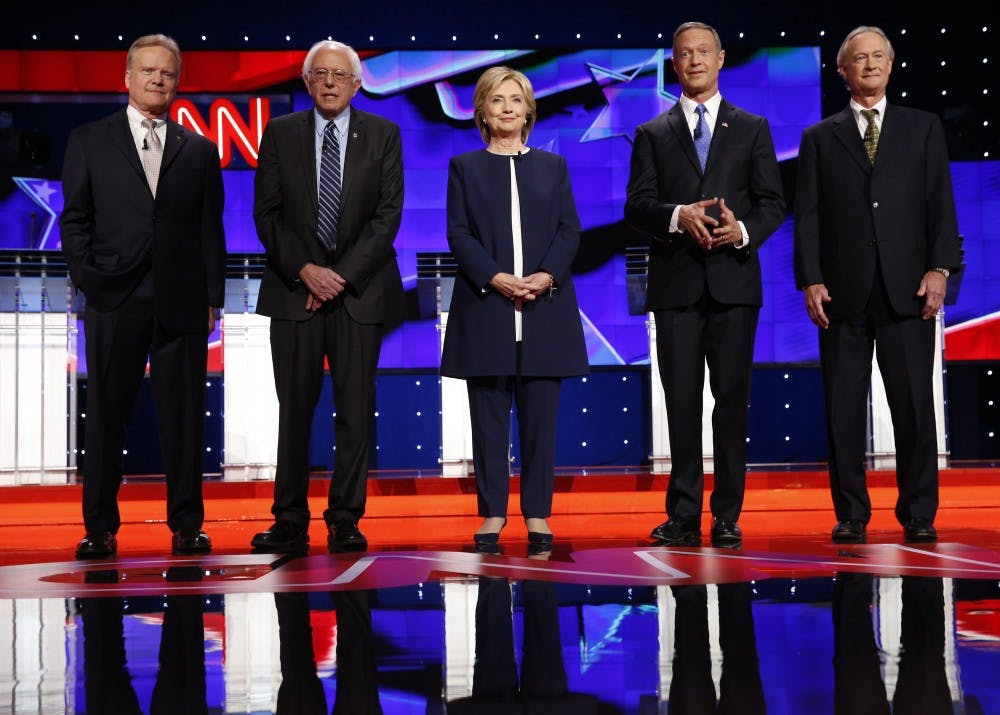Democratic presidential hopefuls Bernie Sanders and Hillary Clinton discussed political issues with an audience at the Democratic Town Hall at the USC Law School on Tuesday.
CNN correspondent Chris Cuomo hosted the event, asking the candidates questions from audience members. Cuomo began with Vermont Sen. Bernie Sanders.
The issues that Sanders tackled first extended from the American criminal justice system to wealthy powers controlling both politics and the economy. Sanders said, “I think people are saying, ‘Enough with establishment politics and establishment economics ... Our government belongs to all of us.'”
Sylvia Johnson of Charleston was in attendance. Johnson is a cousin of the Rev. Clementa Pinckney, who was a victim of the infamous shooting at a Charleston church.
“If elected president, would you change the Gun-Free School Zone Act by allowing staff, teachers and administrators to carry guns in order to defend the students and themselves?” Johnson asked.
Sanders said that he is not comfortable with allowing guns in public places such as schools and churches. “I will tell you at the federal level that we have got to do everything that we can to expand and improve the instant background check. Our goal must be to make sure that people who should not have weapons, guns, do not have guns, and that means people
“Roads, bridges, water systems, wastewater plants, rail, you name it. I'm going to pay for that by ending loopholes that
Vi'Dual Futch, a student at Benedict College, asked Sanders, “Where do historically black colleges, private historically black colleges fall under this plan?”
Sanders assured him that historically black colleges, many of which are private, would also be included. “What I believe is that in the year 2016, when we talk about public education, we should make sure that public colleges and universities are tuition free, that everybody in this country who has the ability and the desire can get a college education,” Sanders said. “You have my word that we will not only sustain, we will substantially increase funding for the historically black colleges and universities.”
Addressing the audience one last time, Sanders gave a
“I would very much appreciate the support — a political revolution when millions of people come together and basically say that our government belongs to all of us and is going to represent all of us, not just
After Sanders finished, former Secretary of State Hillary Clinton joined Cuomo and the voters to discuss their concerns. Like Sanders, Clinton supports Barack Obama’s plan to close Guantanamo Bay.
“I believe the president is right to try to close it. I think it is a continuing recruitment advertisement for terrorists,” Clinton said.
USC student Dennzon Winley asked Clinton, “If Assad was to be deposed, how would you direct the State Department and international partners to install within that country a government capable of containing and mitigating the sectarian and insurgency violence that will undoubtedly increase, thus further destabilizing the region?”
“We've got to stop the ongoing bombing that Russia has carried out in support of the Assad regime against the Syrians themselves, who are trying to wage a civil war against Assad,” Clinton said. “So I'm hoping that that happens because we do have some work to do. And I would like it to be work that, number one, has safe havens for people in Syria, number two, begins a political dialogue.”
Clinton addressed with those in attendance what many
“When I talk about breaking down all the barriers that stand in the way of people's ambitions and dreams, racism, along with economic issues, educational issues, and all the rest, have to be addressed,” Clinton said. “Otherwise, we are never going to be the nation we should be. We're never going to overcome our legacy — dating back to slavery, segregation, Jim Crow."
"Honesty and willingness to listen to each other, respect each other, would go a long way toward us rolling up our sleeves and dealing with a lot of these issues,” she said.
Jamie
“I want you to know that whether you end up supporting me or not, I will support
Clinton touched on the economic struggles of families in the United States. She believes it as much a personal issue as an economic issue.
“On the economic front, let's raise that minimum wage. Let's get more income into the pockets of those women who are minimum wage workers. Let's get equal pay so that people who are working hard are given the dignity, the respect, and the income they deserve,” Clinton said. “Let's get incomes rising again. Let's get more good jobs for more people, something that would help the family feel that they weren't on such rocky terrain and not sure where the next step would be.”
In her closing pitch, Clinton assured the audience that she plans to work on issues such as
“We have work to do. But mostly, I want you to know that it would be an incredible privilege and honor to have the opportunity to represent this country at such a consequential time,” Clinton said. “I feel that I ready, I am willing, and I will serve you with the utmost of my ability and commitment to making this country all it should be for everyone who's in it.”

